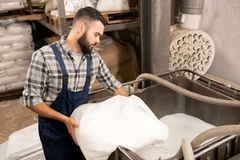New variety brings rice in from the cold
02 Jan 2011

RICE Research Australia Manager Russell Ford says growers will “love” a new cold tolerant rice variety that is set to be released in March next year and is expected to yield the “magical” figure of one tonne per megalitre of water.
RICE Research Australia Manager Russell Ford says growers will “love” a new cold tolerant rice variety that is set to be released in March next year and is expected to yield the “magical” figure of one tonne per megalitre of water.
Mr Ford discussed the new rice product and its pending release, with Federal Coalition Members who visited the rice research facilities at Jerilderie last week, on their Murray Darling Basin listening tour.
Mr Ford said he wanted to help the politicians understand the type of work his company was doing to increase water use efficiencies at grass roots level, through strong Research and Development gains.
“The focus we tried to keep in talking with these politicians was on our water efficiency work,” he said.
“The biggest move we are making at the moment is through cold tolerance. We are about to release a new rice variety with a couple of degrees extra cold tolerance which means you don’t have to insulate it as much. That means less water use but also a higher yield which again relates back to water efficiency.”
In trial work, Mr Ford said the new rice variety had yielded around the “magical” one tonne to one megalitre figure.
“That’s very efficient especially if you compare it to what else is happening around the world,” he said. For example, it’s at least double the water efficiency of most other Asian crops. In field trials we held last year, the new variety yielded close to 13/tonnes per hectare overall.”
Mr Ford said based on last year’s returns of $550/t, the financial outcome of the new variety was another encouraging sign for rice producers.
“If we could repeat that every year the whole world would grow rice.”
The new variety is currently in the seed development stage.
But after its release at the annual Rice Field Day in March 2011, Mr Ford said it would “come on board straight away”, with enough seed available for the rice industry to utilise immediately.
“It will be switched on straight away,” he said.
Source: Rice Research Australia
All content and features on this website are copyrighted with all rights reserved. The full details can be found in our privacy statement
Subscribe to our newsletters
By continuing to browse our site you agree to our Privacy Statement










